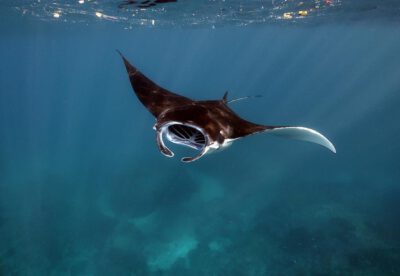
Credit: Anett Szaszi / Ocean Image Bank
The 7th Our Ocean Conference marks the beginning of a new commitment from the Shark Conservation Fund (SCF) to contribute $25 million over the next five years to the improvement of ocean health and biodiversity through sweeping shark and ray conservation.
SCF's new commitment was announced during the 2022 Our Ocean conference co-hosted this year by the governments of the Republic of Palau and the United States.
SCF helps restore and protect the ocean by halting the overexploitation of sharks and rays and preventing extinctions through strategic grantmaking. SCF members include the Paul M. Angell Family Foundation, the Paul G. Allen Family Foundation, the Moore Charitable Foundation, Oceans 5, Leonardo DiCaprio, Re:wild, Save Our Seas Foundation, and the Volgenau Foundation.
“We launched the Shark Conservation Fund to raise awareness and much needed funds for the protection of priority shark and ray species and the need for results-oriented investments in our oceans has only continued to grow,” said actor and environmentalist Leonardo DiCaprio. “Over the last five years, SCF has worked tirelessly to restore populations and prevent extinction and I am thrilled to be able to continue to support this critical work.”
“Our 2022 pledge builds on 5 years of successful collaboration dedicated to maintaining the vibrancy of the ocean by protecting sharks and rays through strategic grantmaking,” said SCF Executive Director Lee Crockett. “The conservation of shark and ray species will prevent extinctions and ensure marine biodiversity. SCF's track record leaves no doubt that it is equipped to make critical gains over the next five years.”
SCF's new commitment will go toward four strategic areas that will have exponential returns for the ocean health and biodiversity:
- Expand additional Marine Protected Areas (MPAs) to benefit sharks and rays. This will help address the impacts of climate change, fishing, and other environmental impacts by protecting and restoring ocean ecosystems. SCF will work with partners to ensure priority shark areas are included in at least 100 of the MPAs established over the next 10 years.
- Protect more species. SCF will support efforts to establish legal protections for sharks and rays that are threatened with extinction. It will focus on countries with the most threatened species that are only found in a single country or region, and those families that are the most endangered, such as sawfish, wedgefish and guitarfish.
- Ensure sustainable trade. SCF will lead a bold and ambitious campaign to regulate a majority of the trade of sharks and rays through CITES, a global treaty, which will obligate participating governments to ensure any trade in listed shark species is legal and “will not be detrimental to the survival of that species.”
- Establish stronger fishing regulations. Toughening fishing regulations—limiting what can be caught, when and where, restricting certain kinds of gear—is essential, so SCF will work with communities and governments to help them develop management plans, build capacity to patrol their waters and enforce regulations, and create alternative job and food programs to reduce the demand for sharks and rays.
SCF exceeded its 2017 Our Ocean commitment to award $8 million over two years to support shark and ray conservation around the world with an ultimate investment of $10 million that catalyzed an additional $13 million investment. This effort netted major conservation outcomes for sharks and rays, including:
- Securing full legal protection for 198 species – approximately 20% of all shark and ray species – in key countries.
- Establishing 207,185 square kilometers of shark and ray beneficial MPAs, with an additional 504,238 square kilometers under development.
- Initiating new shark and ray management measures in 19 countries.
Those results from the past five years demonstrate the power of SCF's model to drive tangible impact for marine conservation through sharks and rays.
Re:wild
www.rewild.org








